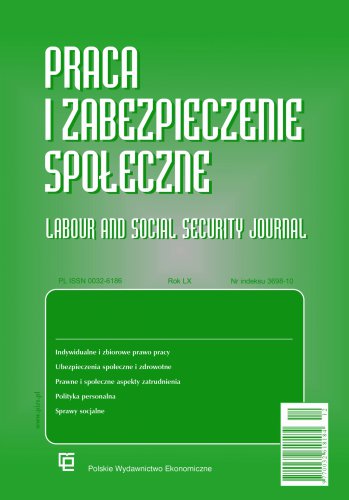EU Work-Life Balance Directive — the challenges for Poland
Balancing work and family responsibilities is a prominent issue for modern society. The relation of subordination and dependence of a worker that characterizes the employment relationship, and makes it different from other work relations, puts an employee in a vulnerable position in terms of control over his or her own working life and balancing it with private life. Participation in paid activity often implies the need to sacrifice private life of the employee, which makes an exchange between the parties to an employment relationship no longer a fair one. Family life is most seriously exposed to a work-life conflict. This is becoming a critical challenge for many employees, especially women with family responsibilities. This contribution aims at offering an analysis of the recent European Union legislative intervention in the work-life conflict — the Work-Life Balance Directive and the position of Poland within this picture. The analysis reveals some limitations of the existing legislation as regards the conditions for people with caring responsibilities to reconcile their working and family duties.
References
Bibliografia/References
Ales, E. (2017). The European Pillar of Social Rights: an ambitious "soft-law guide" to efficient employment and social outcomes. In R. Singer &
T. Bazzani (Eds.), European Employment Policies: Current Challenges (pp. 44–63). Germany: BWV Berliner Wissenschafts-Verlag.
Caraciollo di Torella, E. & Masselot, A. (2010). Reconsilling Work and Family Life in EU Law and Policy. United States: Palgrave Macmillan. https://doi.org/10.1057/9780230246683
Caracciolo di Torella, E. (2017). An emerging right to care in the EU: a "New Start to Support Work-Life Balance for Parents and Carers". ERA Forum, 18(2), 187–198. https://doi.org/10.1007/s12027-017-0477-0
Davidov, G. (2016). A Purposive Approach to Labour Law. United Kingdom: Oxford University Press. https://doi.org/10.1093/acprof:oso/9780198759034.001.0001
Freeman, Ch. & Soete, L. (1994). Work for all of Mass Unemployment. Computerised Technical Change into the 21st Century. United Kingdom: Pinter Wellington House.
Frey, D. F. (2011). Decent Work for All: A Holistic Human Rights Approach. American University International Law Review, 26(2), 465–468.
Garben, S. (2017). Protecting Workers in the Online Platform Economy: An Overview of regulatory and policy developments in the EU. European Risk Observatory Discussion Paper, European Agency for Safety and Health at Work. Luxembourg: Publication Office of the European Union.
Glavin, P. & Schieman, S. (2012). Work-family role blurring and work-family conflict: the moderating influence of job resources and job demands. Work and Occupations, 3(2), 71–98. https://doi.org/10.1177/0730888411406295
Kossek, E. (2016). Managing work life boundaries in the digital age. Organizational Dynamics, (45), 258–270. https://doi.org/10.1016/j.orgdyn.2016.07.010
Kresal, B. (2019). In F. Dorssemont, K. Lörcher, S. Clauwaert & M. Schmitt (Eds.), Charter of Fundamental Rights of the European Union and the Employment Relation (191–208). United Kingdom: Hart Publishing.
Ludera-Ruszel, A. (2016). Ocena funkcjonowania regulacji prawnej dotyczącej uprawnień rodzicielskich pracowników. Studia z Zakresu Prawa Pracy i Polityki Społecznej, (23), 95–109.
Masselot, A. (2011). The Rights and Realities of Balancing Work and Family Life in NZ. In N. Busby & G. James (Eds.), Families, Care-Giving and Paid Work (69–85). United Kingdom: Edward Elgar.
Sobczyk, A. (2005). Zasady prawnej regulacji czasu pracy. Warszawa: ABC.
Świątkowski, A. M. (2010). Polskie prawo pracy. Warszawa: LexisNexis.
Verschueren, H. (2006). The European internal market and the competition between workers. European Labour Law Journal, 6(2), 128–151. https://doi.org/10.1177/201395251500600203
Weiss, M. (2007). Convergence and/or Divergence in Labour Law Systems: A European Perspective. Comparative Labour Law & Policy Journal, (29), 468–472.
Weiss, M. (2011). Re-Inventing Labour Law? In G. Davidov & B. Langille (Eds.), The Idea of Labour Law (pp.43–56). United Kingdom: Oxfrod Univesity Press. https://doi.org/10.1093/acprof:oso/9780199693610.003.0004
Winkelmann-Gleed, A. (2007). Demographic change and implications for workforce ageing in Europe: raising awareness and improving practice. Cuadernos de Relaciones Laborales, (27), 29–50.
Zięba-Załucka, H. (2006). Prawo do pracy jako przedmiot regulacji konstytucyjnych. Praca i Zabezpieczenie Społeczne (2), 2–8.

